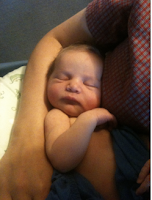The Manger
For Christians the Christmas season traditionally runs all
the way through the celebration of the arrival of the magi on January 6. I have been using these days since
Christmas to reflect more on Jesus and what his birth has meant for humanity
and for all creation.
As this Christmas week has passed I have collected an
amazing mixture of impressions. I
have enjoyed family gatherings, I have listened to the ongoing news of
political brinksmanship, I have walked in these December evenings and marveled
at their beauty, and I have learned of people struggling with things like the
after-effects of storms and the grief and fear of the Newtown shootings.
Through all of this I have wondered about the import of Jesus, born among us on
that first Christmas. I have been
thinking about how to understand the difference it makes in our day-to-day
lives that Jesus was born.
Dietrich Bonhoeffer, a well-known 20th century
theologian, pointed out that we approach the manger, hearing of Jesus’ birth,
in one of two ways: either we approach out of faith, or out of habit. According to Bonhoeffer, people of
faith approach the cradle recognizing that in this baby, somehow God has come
among us to judge creation and to redeem it. Bonhoeffer then goes on to ask this:
What does that mean? Isn’t all of this just a way of
speaking? Isn’t it just pastoral exaggeration of a pretty and pious legend?
What does it mean that such things are said about the Christ child? Those who
want to take it as a way of speaking will do so and continue to celebrate
Advent and Christmas as before, with pagan indifference. For us it is not just
a way of speaking. For that’s just it: it is God himself, the Lord and Creator
of all things, who is so small here, who is hidden here in the corner, who
enters into the plainness of the world, who meets us in the helplessness and
defenselessness of a child, and wants to be with us. And he does this not out
of playfulness or sport, because we find that so touching, but in order to
show us where he is and who he is, and in order from this place to judge and
devalue and dethrone all human ambition. The throne of God in the world is not
on human thrones, but in human depths, in the manger. Standing around his throne there are no flattering
vassals but dark, unknown, questionable figures who cannot get their fill of
this miracle and want to live entirely by the mercy of God.
Bonhoeffer, Dietrich , God Is In
the Manger (Kindle Location 768).
Westminster John Knox Press. Kindle Edition (emphasis mine).
Over the next few days I want to lift up Bonhoeffer’s
suggestion that God came among us in Jesus Christ in order to show who he and
where he is, and in order from this palce to judge and devalue and throne all
human ambition. I think Bonhoeffer
is right that people come to Christmas either through faith or through habit or
civic tradition. I would like to
think more about what it entails to approach the manger out of faith.
And surely it begins by recognizing the mystery that God
has, indeed, come among us. I am
one of many who have marveled that the creator of this universe has taken on
flesh among us. When I walk in the
evenings and think about the mind-boggling vastness of the universe, in which
our solar system is but a speck, and our planet is but a speck within a speck,
and baby Jesus was but half-a-speck within a speck within a speck…how is it
possible that the Creator of all of this is somehow fully among us in that
baby? And how is the majesty of
God, the Creator of all, shown to us in the defenselessness of that child?
I look forward to sharing more on this over the next few
days.




Comments
Post a Comment